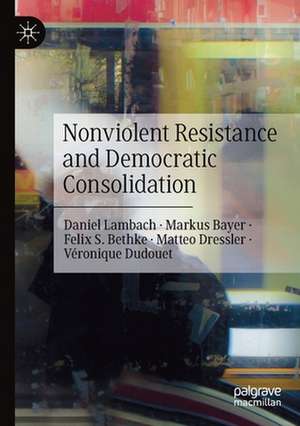Nonviolent Resistance and Democratic Consolidation
Autor Daniel Lambach, Markus Bayer, Felix S. Bethke, Matteo Dressler, Véronique Dudoueten Limba Engleză Paperback – 21 mar 2021
This book argues that democracies emerging from peaceful protest last longer, achieve higher levels of democratic quality, and are more likely to see at least two peaceful handovers of power than democracies that emerged out of violent resistance or top-down liberalization. Nonviolent resistance is not just an effective means of deposing dictators; it can also help consolidate democracy after the transition from autocratic rule. Drawing on case studies on democratic consolidation in Africa and Latin America, the authors find that nonviolent resistance creates a more inclusive transition process that is more resistant to democratic breakdown in the long term.
| Toate formatele și edițiile | Preț | Express |
|---|---|---|
| Paperback (1) | 457.45 lei 3-5 săpt. | +14.46 lei 6-10 zile |
| Springer International Publishing – 21 mar 2021 | 457.45 lei 3-5 săpt. | +14.46 lei 6-10 zile |
| Hardback (1) | 473.40 lei 38-44 zile | |
| Springer International Publishing – 21 mar 2020 | 473.40 lei 38-44 zile |
Preț: 457.45 lei
Preț vechi: 551.15 lei
-17% Nou
Puncte Express: 686
Preț estimativ în valută:
87.54€ • 95.06$ • 73.54£
87.54€ • 95.06$ • 73.54£
Carte disponibilă
Livrare economică 02-16 aprilie
Livrare express 18-22 martie pentru 24.45 lei
Preluare comenzi: 021 569.72.76
Specificații
ISBN-13: 9783030393731
ISBN-10: 3030393739
Pagini: 193
Ilustrații: XI, 193 p. 11 illus.
Dimensiuni: 148 x 210 x 16 mm
Greutate: 0.28 kg
Ediția:1st ed. 2020
Editura: Springer International Publishing
Colecția Palgrave Macmillan
Locul publicării:Cham, Switzerland
ISBN-10: 3030393739
Pagini: 193
Ilustrații: XI, 193 p. 11 illus.
Dimensiuni: 148 x 210 x 16 mm
Greutate: 0.28 kg
Ediția:1st ed. 2020
Editura: Springer International Publishing
Colecția Palgrave Macmillan
Locul publicării:Cham, Switzerland
Cuprins
Chapter 1: Introduction.- Chapter 2: Theory.- Chapter 3: Statistical analysis.- Chapter 4: Mechanisms.- Chapter 5: Inching towards theory.- Chapter 6: Conclusion.
Notă biografică
Daniel Lambach is Postdoctoral Research Fellow at Goethe University, Germany.
Markus Bayer is Research Fellow at University of Duisburg-Essen, Germany.
Felix S. Bethke is Senior Researcher at the Peace Research Institute Frankfurt, Germany.
Matteo Dressler is Researcher at the Flemish Peace Institute, Belgium.
Véronique Dudouet is Programme Director at Berghof Foundation, Germany.
Textul de pe ultima copertă
‘At a time when authoritarianism is resurgent and democracy is under threat globally, this timely book shines a light on a critical but underappreciated driver
of democratization: ordinary citizens.’
—Maria J. Stephan, Director, Program on Nonviolent Action, USIP, USA.
‘This insightful book is essential reading for all interested in democratization in the aftermath of conflict and how mobilization can affect how institutions
evolve.’—Kristian Skrede Gleditsch, Professor, University of Essex, UK.
‘This is an essential contribution to a fascinating interdisciplinary field which shows that unarmed resistance movements facilitate the emergence of democracy.’
— Stellan Vinthagen, Chair and Professor of Sociology, University of Massachusetts, Amherst, USA.
This book argues that democracies emerging from peaceful protest last longer, achieve higher levels ofdemocratic quality, and are more likely to see at least two peaceful handovers of power than democracies that emerged out of violent resistance or top-down liberalization. Nonviolent resistance is not just an effective means of deposing dictators; it can also help consolidate democracy after the transition from autocratic rule. Drawing on case studies on democratic consolidation in Africa and Latin America, the authors find that nonviolent resistance creates a more inclusive transition process that is more resistant to democratic breakdown in the long term.
Daniel Lambach is Postdoctoral Research Fellow at Goethe University, Germany.
Markus Bayer is Research Fellow at University of Duisburg-Essen, Germany.
Felix S. Bethke is Senior Researcher at the Peace Research Institute Frankfurt, Germany.
Matteo Dressler is Researcher at the Flemish Peace Institute, Belgium.
Véronique Dudouet is Programme Director at Berghof Foundation, Germany.
Caracteristici
Positions itself at the intersection of resistance studies, democratization/transition research, and social movement research Elaborates a theory as to why and how nonviolent resistance makes democracies more resilient Offers a detailed explanation of the mode of transition’s impact on democratic quality and democratic consolidation, as well as the underlying mechanisms Includes supplementary material: sn.pub/extras
